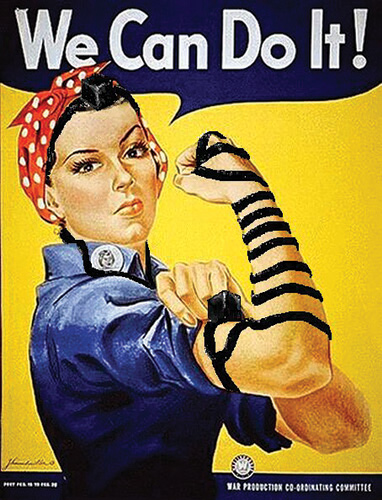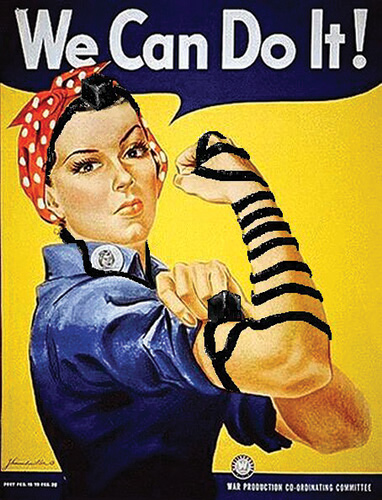
Teaneck—An article about two women who were given permission to wear tefillin at Riverdale’s SAR High School in an all-women’s prayer environment was published initially by The Buzz, a SAR student-run publication on December 8th. The subject was then picked up by a student newspaper at Shalhevet, a similarly styled high school in Los Angeles, and that article was widely circulated on Facebook and other social networking sites. It has subsequently launched an international debate in both print and social media about women taking on the mitzvah of tefillin.
They fall under the category of time-bound mitzvos, which are not required for women, but not strictly prohibited either.
While there has been a move over the last 30 years toward women wearing tefillin in Conservative synagogues, it is generally not accepted or is considered extremely controversial in the Modern Orthodox community, where many associate it with more liberal communities and practices.
Noah Rothman, a student at Shalhevet High School, wrote what became the most widely distributed article on the topic, published January 16th in Boiling Point, Shalhevet’s student-run newspaper. The article focused on two students at SAR High School, who had asked for and received permission to put on tefillin in school every morning as part of an all-female prayer group. According to the article, the women had not been allowed to do this until this past December, and had been putting tefillin on at home, as part of their family’s practices, up until permission was granted. Shalhevet High School students have been surveying the leadership of similarly-styled schools on this topic and writing on the subject of women wearing tefillin in Boiling Point for the past several months.
As part of a firestorm of publicity that appeared in Jewish print media following the article’s publication, a third high school entered the fray. Manhattan’s Ramaz School, headed by Rabbi Haskel Lookstein, will also allow women to put on tefillin in school, should anyone ask, according to an article published January 22nd in the New York Jewish Week.
In light of the vigorous debate that erupted following the publication of these articles, SAR High School’s principal, Rabbi Tully Harcsztark, wrote a letter to parents that sought to explain the motivation behind the decision. The letter is excerpted below:
“Two girls who have put on tefillin since their bat mitzvah approached me months ago to ask permission to put on tefillin in school. Both students, in their respective ways, have shown real commitment to this mitzvah…For me, this was a question of whether I could allow a young woman to practice as she had been taught—to daven each and every day in a meaningful way wearing tefillin as an expression of her עבודת השם. I felt that my responsibility was to consider the person before me and the halakha, before considering the political fallout of the decision.
“In my opinion, the practice of these families has support in halakha. It has basis in the Rishonim (רמב״ם, רשב״א וספר החינוך) and R. Yosef Karo, the מחבר שולחן ערוך, seems to follow that opinion. I felt it appropriate to see this as a legitimate practice albeit different than our communal practice, but one that has halakhic justification. As such, I granted the two girls permission in the context—in a tefilah setting—of a group of girls who were supportive of their practice. I felt it appropriate to create space at SAR for them to daven meaningfully. I explained this to our students in this way: It is a halakhically legitimate position despite it not being our common communal practice.
“…I did not, in so doing, create new policy nor invite any female student who wanted to don tefillin to do so. These are girls who, I believe, have been מוסר נפש (for a teen to get up at 6:20 each morning is meaningful commitment) for this מצוה. At its core, women donning tefillin is a discretionary act in Jewish law. While our community has adopted as normative the view that women refrain from this act, I see the range of rishonim who allow women to don tefillin as support to give space to that practice within our community. One can disagree with this decision on halakhic and public policy grounds, but the position is a coherent one and deserves careful consideration,” he wrote.
Rabbi Harcsztark went on to say that he met Rabbi Yosef Adler, mara d’asra of Congregation Rinat Yisrael and Principal of Torah Academy of Bergen County (TABC), at a community event in December, who expressed support for the decision. “He crossed the room and came over to me, took my hand in his two hands and said, ‘Yasher Koach, you made the right decision. In a world where there are so many things that distract our teens from focusing on mitzvot, we should support teenagers who seek to strengthen their connection to Hashem and to a life of mitzvot. If I taught girls in my school, I would make the same decision.’
“In fact, as he subsequently shared with me, he had made the same decision. A few years back, a woman from the community asked if she could daven at the morning minyan at Rinat, but, she said, ‘I wear tallis and tefillin when I daven.’ Rabbi Adler permitted her to daven in shul. A number of men in the community came over to him and said that they refused to daven in such a minyan,” said Harcsztark.
“That story crystallized it all for me. I told my students (and I went to each of our four grades for a community meeting to explain the decision—as well as giving two faculty shiurim for staff) that I am not committed to the idea of SAR girls putting on tefillin. I am not encouraging our girls to do so. But I am committed to having our boys and girls able to daven in the same shul where a woman might be doing so…That when they see something different, even controversial, before deciding in which denomination it belongs, they must first take a serious look at the halakha and ask their rabbi whether there is basis for such practice. I suspect that I would not differ much regarding normative halakha with most people in our community,” he said. “But I would differ strongly with someone who thought this was cause for that person to be removed from the community, or that such a practice could not be supported within the community shul. I permitted our two female students to daven with tefillin because I believe that we should not be afraid of different forms of עבודת השם when there is halakhic argument to support it. I permitted the young women to daven with tefillin because we should be proud, as a Modern Orthodox community, that we recognize the sanctity and dignity of each person and we find ways to support their spiritual growth in different ways.
“I am proud to say that many students have taken this as an opportunity to learn about their classmates and to learn the sources more carefully. They have engaged each other seriously and respectfully. They have helped shape an atmosphere of support, of care, of אהבת ישראל.
“And here is what we do not do: We do not loosely and without basis malign other Jews, call them names, disparage their motivations and their divine service in the name of…what? I am not sure. I have been reading social media (a new practice for me) and I have been appalled. I have read people maligning these two fine young women with insults and false characterizations based on…nothing. It is awful; it is abominable; it is unacceptable. Two girls who are שומרי שבת וכשרות, גומלי חסד,and בנות תורה. It has been awful to watch. It is מוציא שם רע at its worst (of kids, no less). We should be proud to be stringent in recognizing the dignity of others and valuing their divine service and stringent about how we talk about others, especially children.
“I know that not everyone agrees with my decision. I expect that and I respect that. It is my hope that we can champion, together, ahavat yisrael, love for each Jew; that we can come together as a community even when we disagree; that we can deeply respect each other with pride as we create space for us to work together, as a community, to strengthen ourselves in our עבודת השם.”








